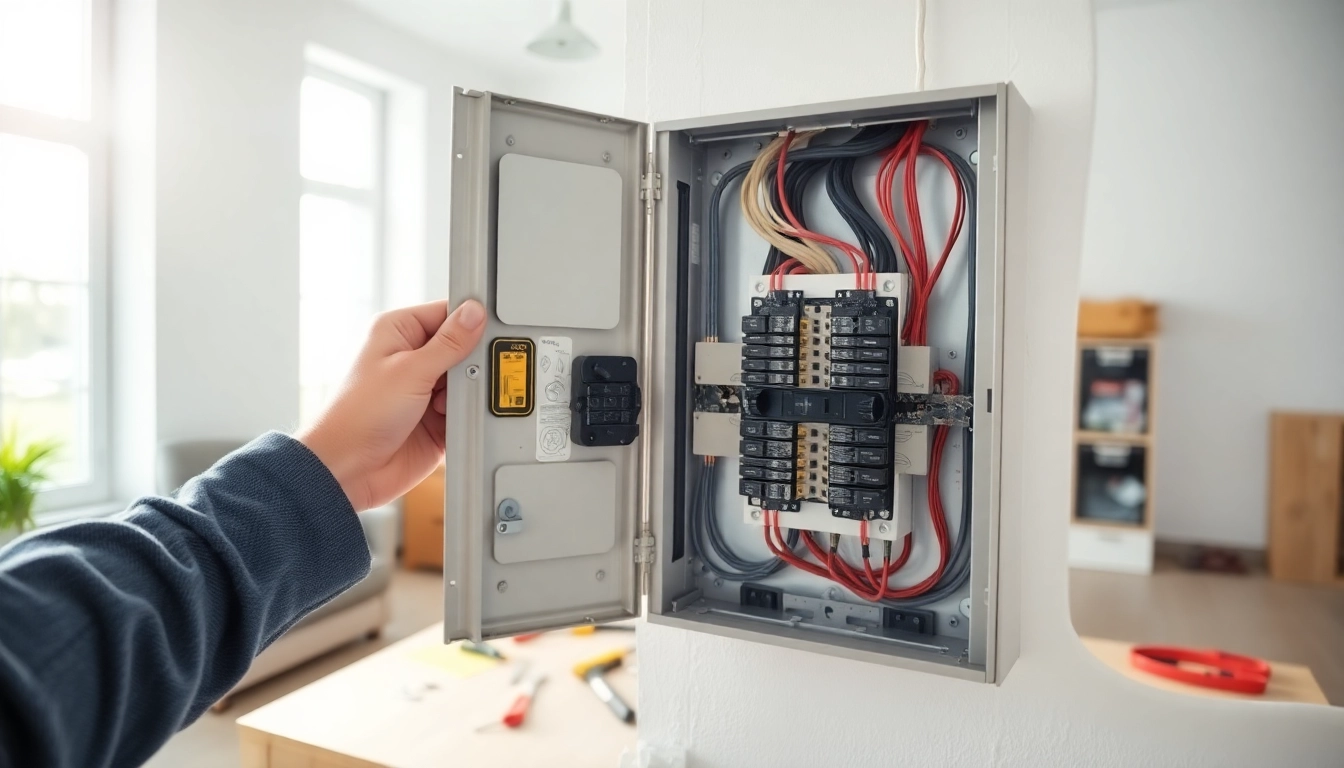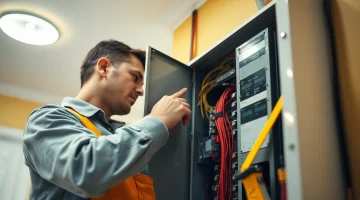
Essential Insights on Electrical Panel Clearwater for Homeowners and Businesses
Understanding Electrical Panels
What is an Electrical Panel?
An electrical panel, also known as a breaker panel or distribution board, is a critical component in any residential or commercial electrical system. It serves as the main hub that distributes electricity from the utility company to different circuits throughout a building. Each circuit is protected by a fuse or circuit breaker, allowing for safe management of electrical loads. A well-functioning electrical panel ensures a reliable power supply and prevents potential hazards associated with electrical systems, such as overloads and electrical fires.
Importance of Maintenance
Regular maintenance of electrical panels is essential to ensure optimal performance and safety. Over time, wear and tear, dust accumulation, and moisture exposure can impact the functionality of the panel. A well-maintained electrical panel helps in:
- Preventing electrical fires caused by faulty wiring or overloaded circuits.
- Ensuring that the electrical system runs efficiently and effectively, minimizing energy wastage.
- Identifying potential issues before they escalate into major problems.
Homeowners should schedule periodic inspections with a qualified electrician to assess the condition of their electrical panels and make necessary repairs or upgrades.
Signs You Need an Upgrade
Identifying the need for an upgrade is vital for maintaining a safe electrical environment. Common signs that indicate the necessity to upgrade your electrical panel include:
- Frequent Circuit Breaker Tripping: If your breakers trip often, it may indicate that your electrical panel is overloaded or cannot handle the current demand.
- Old or Insufficient Capacity: Older homes may have electrical panels with low capacity (100 amps or less), which may not meet the energy needs of modern appliances and devices.
- Visible Damage: Signs of rust, scorching, or burning around the panel could indicate underlying issues that necessitate an upgrade.
- Buzzing Sounds or Flickering Lights: If you hear unusual noises or notice lights flickering, it could signify electrical issues that require immediate attention.
Choosing the Right Electrical Panel
Factors to Consider
When selecting a suitable electrical panel for your property, several factors should be taken into account:
- Capacity Requirements: Assess the total current demand of your home or facility, including everything from lighting to major appliances. Common sizes range from 100 to 400 amps.
- Type of Breakers: Determine whether you need standard breakers, GFCI (Ground Fault Circuit Interrupter) breakers for wet areas, or AFCI (Arc Fault Circuit Interrupter) breakers to prevent fire hazards.
- Future Expansion: Choose a panel that allows for future capacity increases as you may add more electrical appliances or renovations down the line.
- Code Compliance: Ensure that the electrical panel adheres to the latest electrical codes and regulations to guarantee safety and legality.
Electrical Panel Clearwater Specifications
For residents in Clearwater, the unique climate and environmental factors may influence electrical needs. The specifications for a typical electrical panel in this region should include weather-resistant features, especially for outdoor installations or areas prone to humidity. Local codes may dictate specific requirements for panel placement and grounding systems to protect against electrical surges common in coastal regions.
Understanding Standard Ratings
Electrical panels are rated by their maximum current handling capacity, typically expressed in amps. Standard ratings include:
- 100 Amp: Suitable for smaller homes with limited electrical needs.
- 200 Amp: This is the most common size for average-sized homes and offers ample room for various electrical demands.
- 400 Amp: This rating is ideal for larger homes or those with high power consumption needs, such as multiple HVAC systems or home businesses.
Choosing the appropriate rating ensures that the electrical panel can handle your current and future energy requirements without risk of overload.
Upgrading Your Electrical Panel
Step-by-Step Upgrade Process
Upgrading an electrical panel is a significant task that requires careful planning and execution. The following steps illustrate the general procedure for upgrading your electrical panel:
- Assessment: Evaluate your existing panel and electrical needs to determine the appropriate size and type of new panel required.
- Obtaining Permits: Contact your local building department to obtain the necessary permits before beginning any electrical work.
- Shut Off Power: Ensure that the main power supply is turned off to avoid electrical hazards while performing the upgrade.
- Remove the Old Panel: Disconnect all wires and remove the existing panel carefully.
- Install the New Panel: Follow the manufacturer’s instructions to install the new panel securely, connecting the main service wire and circuit breakers as needed.
- Reconnect Circuits: Reconnect all previously established circuits to the new panel, ensuring they are properly secured.
- Inspect and Test: Once the new panel is in place, have your installation inspected by a qualified electrician and conduct tests to ensure everything operates correctly.
DIY vs. Professional Installation
While some homeowners might feel tempted to handle the electrical panel upgrade as a DIY project, it is generally advisable to hire a qualified professional. Here’s a comparison:
- DIY: Can potentially save on labor costs but risks improper installation leading to safety hazards and violation of electrical codes.
- Professional Installation: Ensures that the job is done correctly and safely, adheres to regulations, and often comes with warranty options for added peace of mind.
Cost and Budget Considerations
Upgrading an electrical panel involves various costs, and understanding these is critical for budgeting:
- Panel Cost: The price of the electrical panel itself can vary widely depending on the size and features, typically ranging from $300 to $1,500.
- Labor Costs: Professional expenses can add another $500 to $1,500 to the overall price, depending on your location and the complexity of the installation.
- Permitting Fees: Local building permits may incur additional costs ranging from $50 to $300.
- Additional Supplies: Wires, breakers, and other installation materials will also contribute to the total cost.
Considering these expenses and setting a comprehensive budget can prevent overspending and ensure a successful upgrade.
Safety Practices for Electrical Panels
Common Safety Risks
Electrical panels can pose significant risks if not handled properly. Common safety risks include:
- Electrical Shock: Inadvertent contact with live wires can cause severe injury or death.
- Fire Hazards: Overloaded circuits or faulty equipment can lead to electrical fires.
- Equipment Damage: Surge events can destroy sensitive electronics connected to the electrical system.
Proper Usage Guidelines
To ensure safety when using an electrical panel, adhere to the following guidelines:
- Regularly inspect the panel for signs of wear, damage, or overheating.
- Ensure that the panel enclosure is kept closed and free from clutter to avoid accidental contact.
- Use circuit breakers and fuses with the correct ratings to safeguard against overloads.
- Educate all household members about safe electrical practices, especially regarding avoiding overloading outlets and circuits.
When to Consult a Professional
Consulting a professional electrician is essential in several situations, including but not limited to:
- If you notice persistent issues such as frequent tripping of breakers or flickering lights.
- When upgrading your electrical system to accommodate new appliances or renovations.
- If you are unsure or uncomfortable handling electrical work yourself.
Future Trends in Electrical Panels
Smart Panels and Home Integration
The emergence of smart technology has also made its way into electrical panels. Smart panels can monitor energy consumption in real-time, providing homeowners with valuable insights into usage patterns and potential savings. They can integrate seamlessly with home automation systems, allowing remote management of electrical loads. Additionally, features like alerts for unusual activity can enhance safety and efficiency, making them a wise investment for the future.
Impact of Renewable Energy Sources
As the push for renewable energy sources grows, the role of electrical panels is evolving. Homeowners are increasingly installing solar panels, which require specially designed inverters and connections. Upgrading electrical panels to accommodate renewable sources enhances energy independence and can reduce electricity costs significantly. Those considering solar installations should consult professionals to ensure their electrical systems can support these additions.
Innovations in Electrical Safety
Ongoing advancements in electrical safety include the development of modern breakers that are more efficient at detecting malfunctions. For instance, the increase in the use of arc-fault circuit interrupters (AFCIs) significantly reduces the risk of electrical fires. Additionally, innovations such as surge protective devices can help protect a home’s electrical system from damage due to power surges, further enhancing safety in homes.
In conclusion, understanding the vital function of an electrical panel is crucial for homeowners in Clearwater. By maintaining awareness of its importance, regularly updating systems, and adhering to safety practices, residents can ensure a safe and efficient electrical environment. Addressing any signs that indicate a need for an upgrade not only secures your property but can offer significant benefits in energy efficiency and home value. For more information on electrical panels and when to upgrade, refer to Electrical Panel Clearwater.



